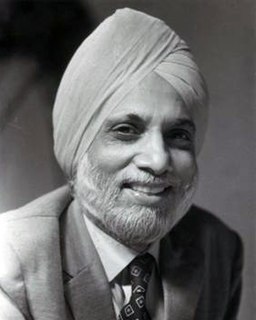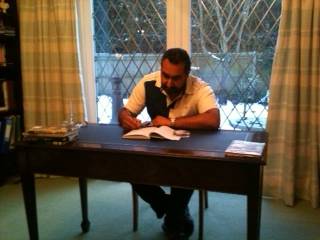
A missionary is a member of a religious group sent into an area to promote their faith or perform ministries of service, such as education, literacy, social justice, health care, and economic development. The word "mission" originates from 1598 when the Jesuits sent members abroad, derived from the Latin missionem, meaning "act of sending" or mittere, meaning "to send". The word was used in light of its biblical usage; in the Latin translation of the Bible, Christ uses the word when sending the disciples to preach The gospel in his name. The term is most commonly used for Christian missions, but can be used for any creed or ideology.
The Punjabis or Punjabi people are an Indo-Aryan ethnolinguistic group associated with the Punjab region in South Asia, specifically in the northern part of the Indian subcontinent, presently divided between Punjab, India and Punjab, Pakistan. They speak Punjabi, a language from the Indo-Aryan language family. The name Punjab literally means the land of five waters in Persian: panj ("five") āb ("waters"). The name of the region was introduced by the Turko-Persian conquerors of the Indian subcontinent. The historical Punjab region is often referred to as the breadbasket in both India and Pakistan.

The Mūl Mantar is the first composition in the Sikh holy text, the Adi Granth, which would become the Guru Granth Sahib, written in Punjabi. It is a series of affirmations and is the basis of Sikh theology, as well as the fundamental prayer. The Mul Mantar is the first composition of Guru Nanak Dev Ji. The Guru Granth Sahib begins with the Mul Mantar and it occurs more than one hundred times throughout the text where it is placed at the beginning of the particular Shabad, or hymn. In one of the Janamsakhis, the martyr Bhai Mani Singh explains that the reason for placing the Mul Mantar at the beginning of a Shabad is that a Gursikh, or full devotee of the Guru, is reminded that everything else will fade, and only the Satnam, the all-pervading supreme reality, will remain.

Kartar Singh Duggal was an Indian writer who wrote in Punjabi, Urdu, Hindi, and English. His works include short stories, novels, dramas and plays. His works have been translated into Indian and foreign languages. He has served as Director, All India Radio.

Gurdwara Sri Guru Singh Sabha Southall (SGSS) is a Sikh gurdwara situated on Havelock Road and Park Avenue, Southall, in the London Borough of Ealing. It is the largest Sikh temple in London. Building work at the Havelock Road site commenced in March 2000 and the gurdwara opened on Sunday 30 March 2003, in order to accommodate Southall's growing Sikh community. The gurdwara cost £17.5 million to build. It was funded by donations from members of the local Sikh community.

Vir Singh was an Indian poet, scholar, and theologian of the Sikh revival movement, playing an important part in the renewal of Punjabi literary tradition. Singh's contributions were so important and influential that he became canonized as Bhai, an honorific often given to those whom could be considered a saint of the Sikh faith.

Rupinderpal Singh Dhillon or Roop Dhillon is a British Punjabi writer of fiction and poetry.
Harjeet Atwal is a Punjabi writer, novelist in Indian literature specially in Punjabi and Hindi languages. He has written many books and many articles and delivered lectures. He is also known as a storyteller and poet. Now he lives in London with his wife and three children.
The Sikhs are adherents to Sikhism the fifth largest organized religion in the world, with around 27 million adherents. Sikh History is around 500 years and in that time the Sikhs have developed unique expressions of art and culture which are influenced by their faith and synthesize traditions from many other cultures. Sikhism is Punjab's only indigenous religion with all other religions coming from outside Punjab. All the Sikh gurus, saints and majority of the martyrs in Sikh history were from Punjab and from the Punjabi people. Punjabi culture and Sikhism are considered inseparably intertwined. "Sikh" properly refers to adherents of Sikhism as a religion, not an ethnic group. However, because Sikhism has seldom sought converts, most Sikhs share strong ethno-religious ties. Many countries, such as the U.K., therefore recognize Sikh as a designated ethnicity on their censuses. The American non-profit organization United Sikhs has fought to have Sikh included on the U.S. census as well, arguing that Sikhs "self-identify as an 'ethnic minority'" and believe "that they are more than just a religion".
The permanent arrival of Sikhism in England is dated to 1850 A.D. with the arrival of Maharajah Duleep Singh. The first Sikh place of worship, called a Gurdwara, was opened in 1911 in London and this was partly funded by the Maharaja of Patiala.
Karam Singh (1884–1930) was a Sikh historian.He was born in Jhabal a famous town 8km south of Amritsar. His father Jhanda Singh belonged to traditional Sikh family
British Indians form the largest ethno-national group in London with a population of around 542,857 or 6.6% of the population. The majority are concentrated in West London, home to London's Hindu community, though populations can be found throughout London.

Singapore Navy
The Punjabi diaspora refers to the descendants of ethnic Punjabis who emigrated out of the Punjab region in the northern part of the Indian subcontinent to the rest of the world. Punjabis are one of the largest ethnic groups in both the Pakistani and Indian diasporas. The Punjabi diaspora numbers around 10 million, mainly concentrated in Britain, North America, Southeast Asia and the Middle East.
Harbans Singh was an educationist, administrator, scholar and the editor-in-chief of the Encyclopaedia of Sikhism. He was respected for his contributions to Sikh scholarship and Punjabi literary studies and had a vital and pervasive influence in the field of religious studies, with special reference to Sikhism.
South Asian Canadians in Metro Vancouver form the third-largest ethnic group in the region, comprising 291,005 or 12% of the total population. Sizable South Asian communities exist within the city of Vancouver along with the adjoining city of Surrey, which houses one of the world's largest South Asian enclaves.
Punjabi Canadians are Canadian citizens whose heritage originates wholly or partly in the Punjab, a region in northern South Asia, which encompasses India and Pakistan. There are large Punjabi communities in British Columbia, concentrated in Metro Vancouver, and Ontario, particularly in the Greater Toronto Area.
British Punjabis are citizens or residents of the United Kingdom whose heritage originates wholly or partly in the Punjab, a region in South Asia which is divided between India and Pakistan. Punjabis are a major sub-group of the British Indian and British Pakistani communities, and represent the largest ethnicity among British Asians.










